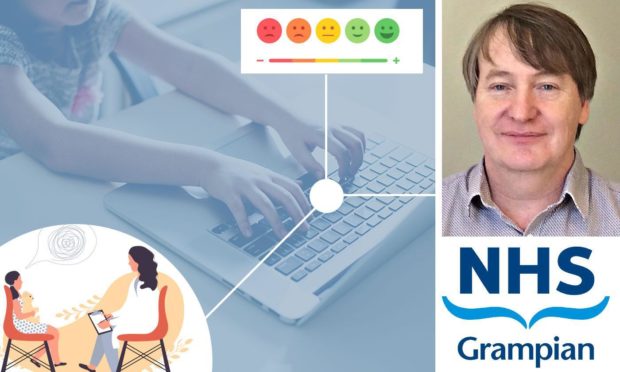North-east medics are helping develop new technology for sick kids struggling to cope – with a particular focus on those living with gastrointestinal issues.
NHS Grampian is working with two companies to prototype and test their ideas.
Last year, the health board launched a search for partners to help launch a new cognitive behavioural therapy (CBT) scheme for children and young people.
It is being specifically aimed at those with gastrointestinal issues like irritable bowel syndrome (IBS), as the illness can take a massive toll on their everyday lives.
Children can develop a fear their illness ‘isn’t believed’
Dr Andy Keen, the health board’s clinical lead for innovation and a consultant health psychologist, said this often goes beyond just the physical symptoms.
“If they start taking time off school and visiting GPs and others frequently, they’ll have a sense – whether it’s true or not – that people aren’t believing them,” he explained.
“That drives frustration and it can trigger low mood, making them feel even worse physically as well as in terms of their wellbeing.
“Typically it will disrupt their schooling, they might stop going out and seeing their friends as much, and often they’ll stop doing sports and pastimes they really enjoy.”
Range of triggers making sickness worse
Around 40% of all adults and children seen at hospital clinics have one of these “overall functional disorders,” where they are caused without any underlying disease.
Many others will be suffering the symptoms, but can manage their illness with trips to a GP or just within their family.
“But that doesn’t mean it’s not impacting on their wellbeing and life,” Dr Keen said.
“It’s been really clear during the pandemic that, if we stop doing the things we like most, and seeing friends, and going to work or school, it can have a significant impact on people’s emotional wellbeing.
“All those things are buffers to our mood dropping and feeling stress in life.
“So it’s about promoting a way of engaging back in the world and getting their life back to the way they want it to be.
“And if we can do that, their emotional wellbeing improves and they’re not as troubled by their symptoms.”
‘Most interesting and exciting project to date’
Last year NHS Grampian’s Innovation Hub launched a Small Business Research Initiative (SBRI) competition to find a solution.
After receiving 73 proposals, it heard five pitches then whittled the competition down to two – Edinburgh-based Voxiso and Tacit Connexions from Wokingham.
It is now working with both to prototype and test out their cognitive behavioural therapy ideas, before rolling one out further.
There’s a need for new technology
While computerised cognitive behavioural therapy packages are already being prescribed by GPs across Grampian, and wider Scotland, there are none specifically designed for youngsters.
These can be “fairly formulaic” and rotate between weekly sessions and “homework”. As a result, the rate of people dropping out can be quite high.
Dr Keen said: “It’s really important that we use some of the cutting edge technology available to engage children and young people, and tailor conversations over time.
“You can deliver psychological interventions as quickly as possible – there’s no point in people doing eight weeks of stuff if they only need one or two.
“It’s about tailoring and engaging so we can help people as quickly as possible and to the extent they need.”
He added: “Although the government has put a lot of money into mental health we just don’t have enough staff.
“Not only do we not have enough staff today, we won’t tomorrow, or in five years or in 10 years.
“The level of need out there is just beyond our ability to provide care to.
“Less than 40% of people come forward for help, and more than 80% get medications rather than referrals to psychological therapist.
“That’s not because GPs don’t want to refer, it’s because there aren’t enough – so we really need to be very innovative.
“For people with mild to moderate difficulties these products could provide care to a whole population of people we’ve got no chance of reaching.”

